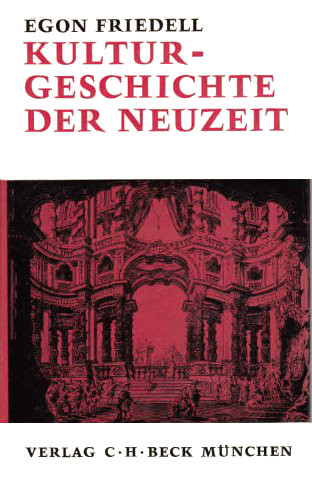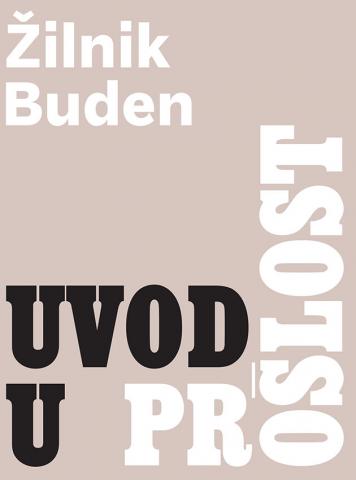Egon Friedell: A Cultural History of the Modern Age (1927–) [DE, EN]
Filed under book | Tags: · aesthetics, art history, cultural history, history, modernity, politics, religion

Austrian essayist, cabaret performer, and amateur cultural historian Egon Friedell is best known for his brilliant, playful, and stimulating magnum opus, A Cultural History of the Modern Age (1927-31), written under the influence of Oswald Spengler and Jacob Burckhardt. He hoped for a rebirth of Western culture; the Modern Age, which was born from the Great Plague of the fourteenth century, has come to its end. At the eve of World War II, Friedell committed suicide by jumping from a window of his apartment. The German writer Thomas Mann ranked Friedell as one of the greatest stylists of the German language.
A Cultural History of the Modern Age, inspired by H.G. Well’s The Outline of History (1920), is dedicated to Max Reinhardt. Its first volume deals with Renaissance and Reformation, the second Baroque, Enlightenment and the French Revolution, and the third part Romanticism, Liberalism, Imperialism, and Impressionism. Friedell’s view is subjective and intuitive – all history is saga and myth and it is nothing more than a difference in degree between historian and poet. “All the classifications man has ever devised are arbitrary, artificial, and false,” Friedell wrote, “but simple reflection also shows that such classifications are useful, indispensable, and above all unavoidable since they accord with an innate aspect of our thinking.” Following the Hegelian lines of though, Friedell sees his subject basically as a the process of spiritual history. Oswald Spengler’s (The Decline of the West, 1918-1922) pessimism and atheism he rejects. From the English writer, historian, and critic Thomas Carlyle (1795-1881) Friedell adopted the romantic “great man” theory of history, the hero-worship, totally ignoring its ominous connection with the political reality of his day. Every era and every generation has according to Friedell its own hero, a genius, who personifies the Zeitgeist, the spirit of the age. Nietzsche was for Friedell the epitome of the pre-WW I era. (from Petri Liukkonen’s short biography of Friedell)
German edition
Publisher Beck, Munich, 1927, 1928, 1931
This edition, Zweitausendeins, Frankfurt am Main, 2009, 1335 pages
English edition
Translated by Charles Francis Atkinson
With an Introductory Essay by Alfred Polgar
Publisher Alfred A. Knopf, 1930, 1931, 1932
Fifth printing, 1953 (Vol 1); Third printing, 1954 (Vol 2); First printing, 1932 (Vol 3)
353 + 457 + 489 pages
via hz40lat46
Review (of Vol 1, Crane Brinton, Speculum, 1953)
Review (of Vols 1-2, International Journal of Ethics, 1932)
Review (of Vol 2, Eli Siegel, Scribner’s Magazine, 1931)
Review (of Vol 3, Robert Briffault, Scribner’s Magazine, 1932)
Review (of Vol 1, C. Hartley Grattan, The Forum, 1930)
Review (of Vol 1, David Owen, The Saturday Review, 1930)
Review (of Vol 2, The Saturday Review, 1932)
Review (of Vol 3, Alfred M. Frankfurter, The Bookman, 1932)
Wikipedia (DE)
Kulturgeschichte der Neuzeit; Kulturgeschichte Ägyptens (German, 1927-31/2009, at Archive.org)
A Cultural History of the Modern Age, Volume I, Volume II, Volume III (English, trans. Charles Francis Atkinson, 1930-32, no OCR)
Boris Buden, Želimir Žilnik, kuda.org, et al.: Uvod u prošlost (2013) [Serbian]
Filed under book | Tags: · avant-garde, cinema, cultural history, culture, film, politics, yugoslavia

“Ovo je knjiga koja se naizgled bavi jednim sasvim određenim segmentom prošlosti, nečime što se je nekada zvalo kulturna povijest. No, tu kulturnu povijest ona ne tretira kao posebnu disciplinu historiografije koja za svoj predmet uzima ono što je u prošlosti steklo status kulturnog dobra. Za ovu knjigu kulturna povijest je sama forma u kojoj nam se danas ukazuje prošlost. U mjeri u kojoj smo svjesni prošlosti, svjesni smo je kao kulture.
Konkretno, kada se u ovoj knjizi govori o kulturnoj proizvodnji bivše Jugoslavije, o filmovima, odnosno o takozvanom filmskom jeziku redatelja Želimira Žilnika, kada se u njoj raspravlja o sukobima u kulturi, njihovim akterima, odnosu politike i umjetnosti, o ekonomskim pretpostavkama filmske produkcije i njenim društvenim efektima, onda se o tome ne govori u disciplinarnom smislu jedne, recimo, povijesti jugoslavenskog filma, odnosno, individualnog filmskog djela određenog redatelja, pri čemu kategorije društva, politike i ekonomije služe kontekstualizaciji jednog po sebi čisto kulturnog narativa. Kultura se ne zbiva u nekakvom unaprijed zadanom ekonomskom, političkom i društvenom kontekstu; ona je kao takva uvijek već i ekonomska činjenica i politički faktor i društveni proizvod. Ona nam ne govori o tome kakva je prošlost doista bila, nego jest ta prošlost u njenoj prisutnosti, aktualnosti, neizvjesnosti, otvorenosti. Ona je prošlost s onu stranu njene razlike spram sadašnjosti i budućnosti.” (Iz predgovora)
Publisher Centar za nove medije_kuda.org, Novi Sad, September 2013
kuda.read series
Copyleft license
ISBN 9788688567077
221 pages
Robert Darnton: Great Cat Massacre and Other Episodes in French Cultural History (1984–)
Filed under book | Tags: · cultural history, enlightenment, france, history, reading

“When the apprentices of a Paris printing shop in the 1730s held a series of mock trials and then hanged all the cats they could lay their hands on, why did they find it so hilariously funny that they choked with laughter when they reenacted it in pantomime some twenty times? Why in the eighteenth-century version of Little Red Riding Hood did the wolf eat the child at the end? What did the anonymous townsman of Montpelier have in mind when he kept an exhaustive dossier on all the activities of his native city? These are some of the provocative questions Robert Darnton answers in this classic work of European history in what we like to call ‘The Age of Enlightenment.'”
First published in 1984
Publisher Basic Books, New York, 1990
ISBN 0465027008
298 pages
Reviews: Roger Chartier (Journal of Modern History, 1985), David E. Apter (American Journal of Sociology, 1985).
Commentaries: Darnton (Journal of Modern History, 1986), Dominick LaCapra (Journal of Modern History, 1988), Philip Stewart (Journal of Modern History, 1994).
PDF, PDF
EPUB (Revised edition)

